"I look at philanthropy the same way I look at my business investments," Muneer Satter, Founder and Chairman of Satter Investment Management, once told me. "I'm looking for exponential returns." In the humanitarian sector where I operate, we've unfortunately grown accustomed to less-than-optimal returns. We do our best to improve security and quality of life for the world's vulnerable populations, but we rarely make a dent in solving the most intractable conflicts or dire emergencies.
As I describe in my book, "To Stop a Warlord," nontraditional partnerships are one strategy that can make the impossible possible. In corporate and nonprofit spaces, and everywhere in between, when we collaborate in unprecedented ways, we buck the status quo and step outside our comfort zones. This retrains us to think without limits and gives us an augmented capacity to make major change in the world.
The results of nontraditional partnerships can be successful in solving problems and lasting in their innovation—and the results can also be surprising. The massive problem we were trying to tackle was to end a long-standing armed conflict in Central Africa where a rebel group called the Lord's Resistance Army (LRA) had been terrorizing citizens of four countries for twenty-five years. More than one hundred thousand people had been killed, almost two million innocent civilians displaced, and at least thirty thousand children abducted and forced to become soldiers or sex slaves in what was already Africa's longest-running war.
Ending the LRA conflict seemed like a lost cause. But we set forth on forging an unlikely alliance of private and public entities—including philanthropists, humanitarian organizations, local civil society leaders, and the U.S. and Ugandan militaries—to intervene. By the end of our intervention, many top-tier LRA leaders and at least fourteen percent of the LRA's core fighting force had defected or been captured; and there had been a ninety percent reduction in LRA killings.
There are four major lessons to be drawn from the unparalleled success of this unlikely partnership.
RELATED: A group of women in Angola are bravely working to clear their country of landmines
Thoroughly Dissect the Goal or Mission Statement
Too often, organizations get caught up in the jargon of their work, glossing over the fact that the outcomes don't match the stated goals. It's imperative that leaders encourage the hard work of scrutiny and honesty so that the desired results and the actual results are in better alignment. For example, part of Bridgeway Foundation's mission statement reads: to prevent oppression, genocide, and human rights abuses throughout the world. But our outcomes — researching ongoing violence, performing analysis, supporting victims of violence, making policy recommendations, creating campaigns to motivate political leaders to prioritize ending crises around the globe—didn't match our mission: to stop mass atrocities. Acknowledging this discrepancy was the first step toward a major course correct.
Rethink the Approach, Start by Listening
In any field, but especially in humanitarian work, there's a risk in taking strategies that have been successful in other contexts and imposing them in new environments and situations where they might not be the right fit or fill the most important needs. The only way to know what's needed is to ask and to listen. In seeking information and guidance, it's important to consult these three sources:
1) The experts in the area where your organization needs to change or grow.
2) The people with the most direct experience in the area where your organization needs to change or grow.
3) The people most impacted by the success or failure of your work.
While the first group probably goes without saying, the third group is often neglected, especially when the people who stand to benefit or suffer most from a decision are disenfranchised in some way. It's important to ask, who isn't being heard?
Ask What You're Willing to Risk for What You Believe In
An unprecedented alliance can be risky. So how do you know if it's the right move? Ask yourself which is greater: the risk of doing nothing, or the risk of pushing beyond the bounds of business as usual? If doing nothing is the greater risk, it's time to pivot how you partner.
In my experience, a nontraditional alliance isn't a one-off risk—it's a collaboration that will push each partner again and again to discover how far they're willing to go. For example, in the work to stop the LRA, an opportunity for a critical operation arose, but the mission was short on aircraft. If the team couldn't come up with the funding to contract helicopters and pilots on short notice, the critical moment would be lost. Vital contributions at the last hour allowed the operation to continue. Partnering in unlikely ways often requires huge risk and commitment—and it might push us to go farther than anyone would have thought possible in service of the goals. That's because, from the get-go, these partnerships require those involved to act in service of their highest ideals—to find what motivates them, individually and collectively, to make the sacrifice, and to accept opportunities to go all-in in the investment.
RELATED: Justice finally served in the case of a Nazi who unleashed a troll army on a Jewish woman
Step "Out of Bounds"
When you try something unprecedented, there's no road map for success.
This alliance wasn't perfect, nor did it achieve one hundred percent of its original goals. But with an over ninety percent reduction of LRA violence, a war criminal on trial at the ICC in the Hague, and 730 peaceful defections over a five-year period, there is no question that, together, we moved the needle forward and dramatically altered the global landscape of conflict resolution and security.
Such nontraditional alliances can prove fruitful in any industry—joining forces with diverse partners allows us to fill gaps and augment capabilities. And sometimes, nontraditional partnerships are precisely what we need to achieve exponential returns.
Shannon Sedgwick Davis is the CEO of Bridgeway Foundation, a philanthropic organization dedicated to ending and preventing mass atrocities around the world. As an attorney, activist, passionate advocate for social justice, Sedgwick Davis has guided Bridgeway Foundation in pioneering solutions to these seemingly intractable issues. She is also the author of To Stop A Warlord: My Story of Justice, Grace, and the Fight for Peace.















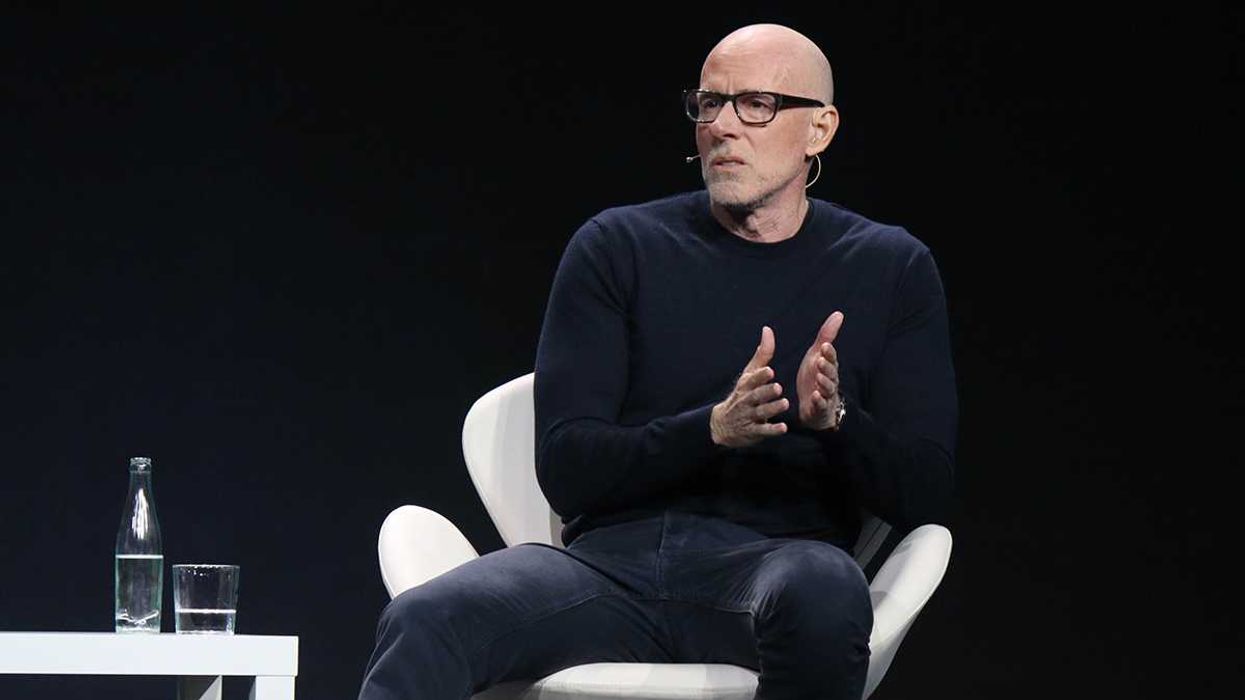
 Self reflection.Photo credit
Self reflection.Photo credit  Older woman touching hands with a younger self.Photo credit
Older woman touching hands with a younger self.Photo credit  Sign reads, "Regrets Behind You."Photo credit
Sign reads, "Regrets Behind You."Photo credit 
 Couple talking in the woods.
Couple talking in the woods.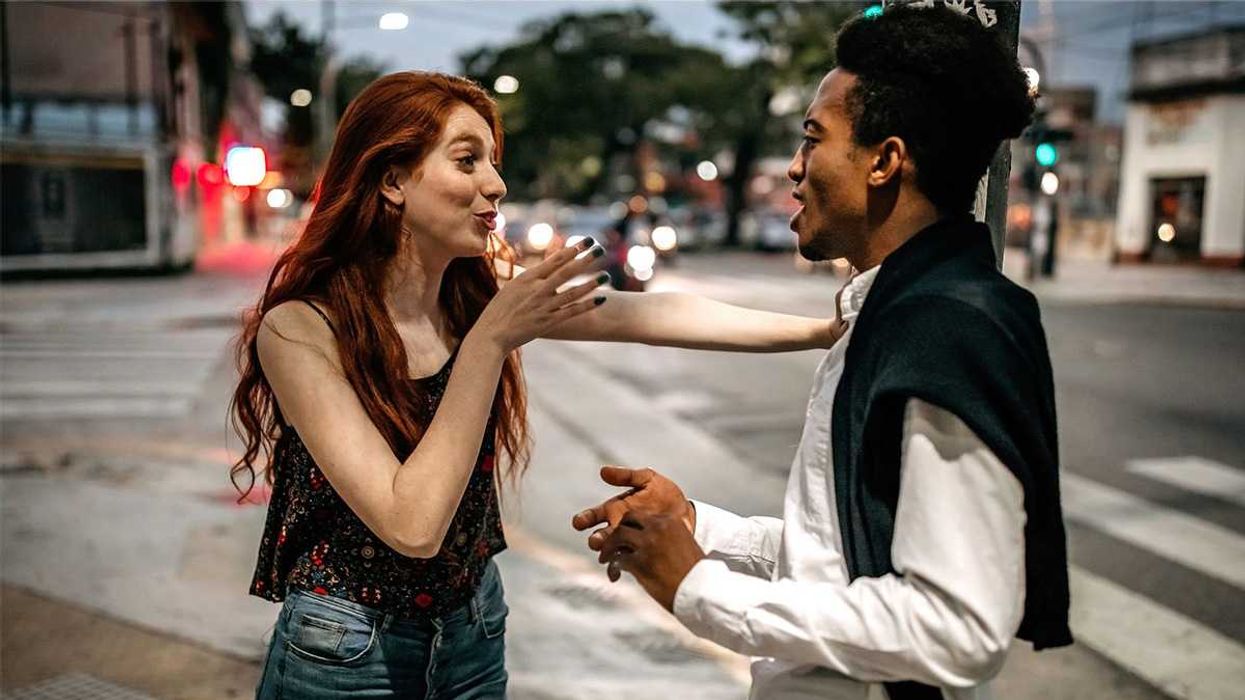 Woman and man have a conversation.
Woman and man have a conversation. A chat on the couch.
A chat on the couch. Two people high-five working out.
Two people high-five working out.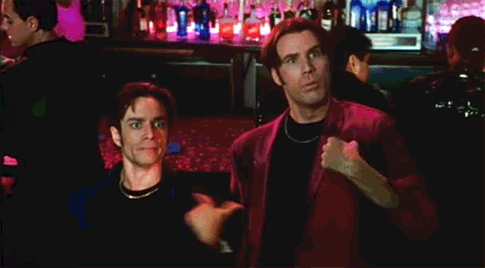 Movie scene from Night at the Roxbury.
Movie scene from Night at the Roxbury.  Friends laughing together.
Friends laughing together.
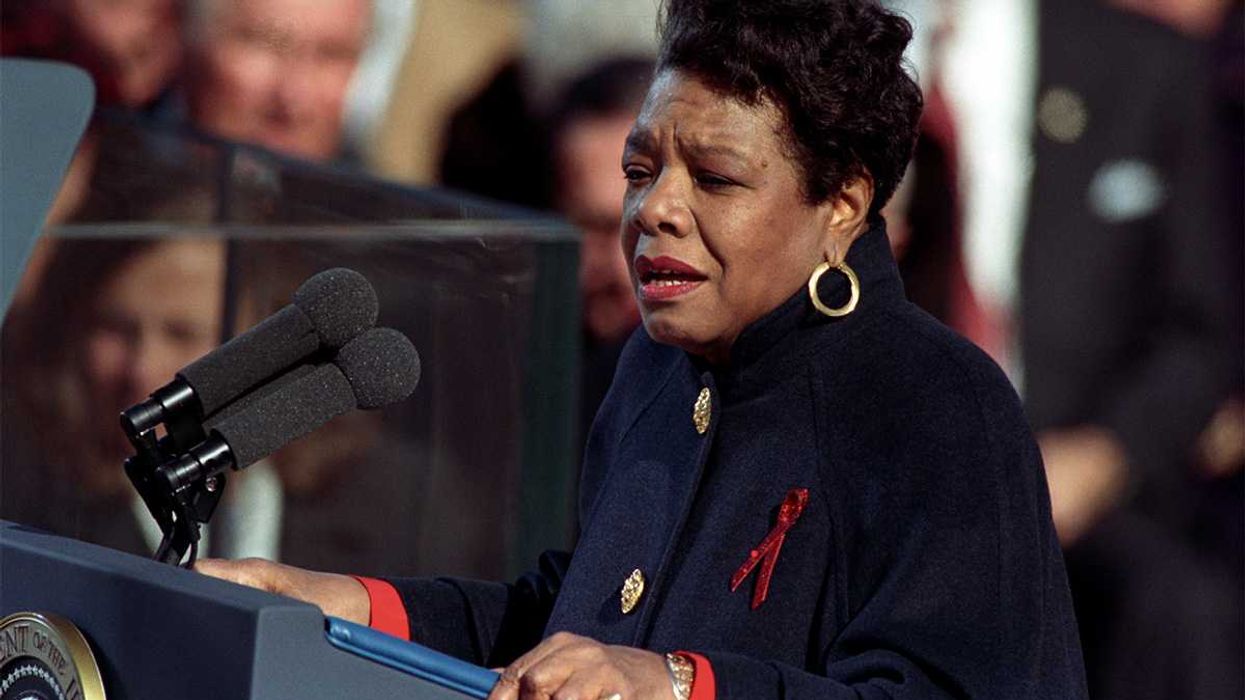 Maya Angelou reciting her poem "On the Pulse of Morning" at President Bill Clinton's inauguration in 1993.William J. Clinton Presidential Library/
Maya Angelou reciting her poem "On the Pulse of Morning" at President Bill Clinton's inauguration in 1993.William J. Clinton Presidential Library/ 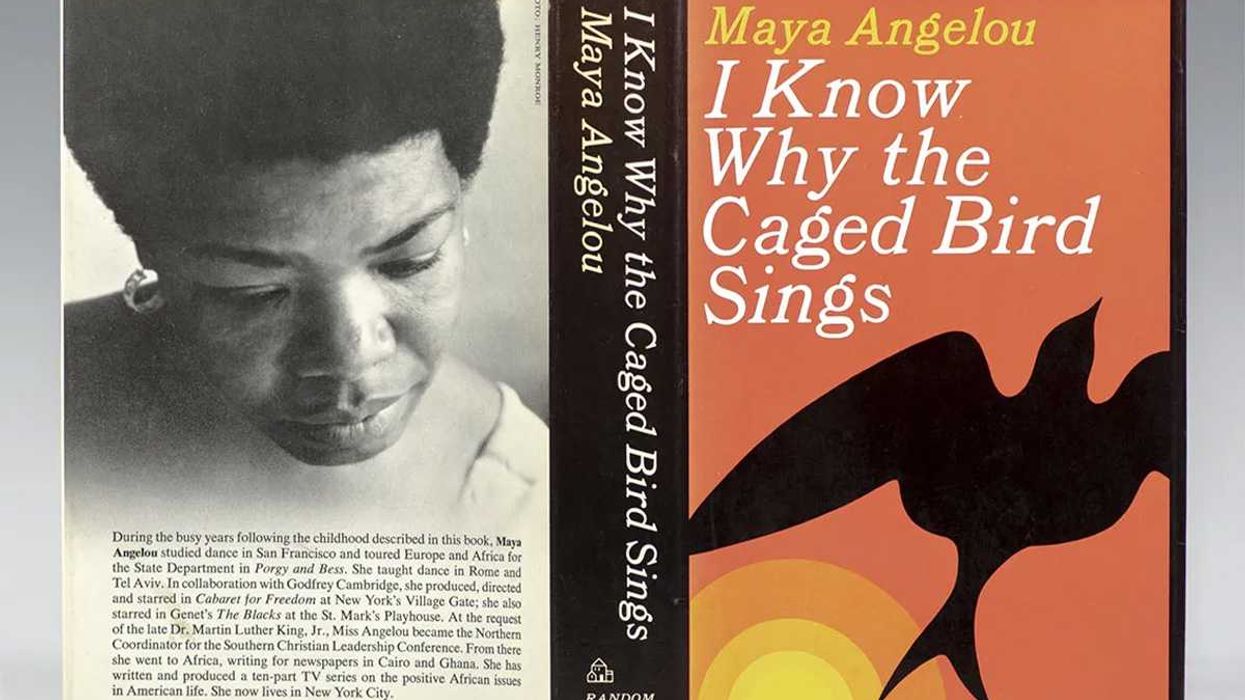 First edition front and back covers and spine of "I Know Why the Caged Bird Sings."Raptis Rare Books/
First edition front and back covers and spine of "I Know Why the Caged Bird Sings."Raptis Rare Books/ 
 Tow truck towing a car in its bedCanva
Tow truck towing a car in its bedCanva  Sad woman looks at her phoneCanva
Sad woman looks at her phoneCanva  A group of young people at a house partyCanva
A group of young people at a house partyCanva  Fed-up woman gif
Fed-up woman gif Police show up at a house party
Police show up at a house party 
 A trendy restaurant in the middle of the dayCanva
A trendy restaurant in the middle of the dayCanva A reserved table at a restaurantCanva
A reserved table at a restaurantCanva Gif of Tim Robinson asking "What?' via
Gif of Tim Robinson asking "What?' via 

 An octopus floating in the oceanCanva
An octopus floating in the oceanCanva